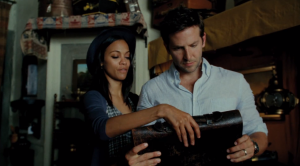THE WORDS: 0 STARS
 The structure of “The Words” is mind-bending. It’s the story of a reading of “The Words,” a novel about a young writer who commits a great literary sin, which makes up the narrative thrust of the movie, until a second narrator shows up and takes over the story from the first one. Like that M.C. Escher painting of one hand drawing another it’s hard to tell where this story wrapped-in-a-story wrapped-in-a-moral dilemma begins or ends.
The structure of “The Words” is mind-bending. It’s the story of a reading of “The Words,” a novel about a young writer who commits a great literary sin, which makes up the narrative thrust of the movie, until a second narrator shows up and takes over the story from the first one. Like that M.C. Escher painting of one hand drawing another it’s hard to tell where this story wrapped-in-a-story wrapped-in-a-moral dilemma begins or ends.
Dennis Quaid plays Clay Hammond, a best selling author speaking in front of a black tie crowd. Reading from his book “The Words” he spins a tale about struggling author Rory (Bradley Cooper), so desperate for success he submits a manuscript he didn’t write to a top agent. He found the yellowed typed pages tucked inside an antique briefcase he bought while on honeymoon in Paris.
The book is a work of genius, gets published and soon he is being treated like the next big thing.
Here’s where things get confusing and a bit mind-bending. As told by Clay, Rory meets the old man (Jeremy Irons) who wrote the book after the war while he was married to a French national. Then, in a terrible accent (the movie excuses his lapses by suggesting his Pennsylvania twang is coloured by his English birth), Irons tells the tale of how the book came to be written. It’s a story within a story that was already being told through the framework of the film’s narrative. Before dropping a major plot point the old man says, “Wait! This is where things get interesting.”
If only he were right.
The film continues with yet another subplot about a young woman named Danielle (Olivia Wilde) who tries to seduce Clay at the intermission of his book reading and more flashbacks (which have all the charm of documentary reenactments) and even more of Rory’s moral dilemma.
As for the rest of the story, well, words fail me. Or should I say, “The Words” failed me.
As might be appropriate for a film called “The Words” the script is wordy. Trouble is, very few of the words are terribly interesting. We are supposed to believe that Hammond is a great writer, capable of filling a theatre with people who will be transported by his ingenious turns of phrase and mastery of story. Too bad there’s no evidence of that in the film. There’s no artfulness on display in the considerable amount of narration Clay vocalizes. Mostly he sounds like he’s reading a police report. “And on a Friday afternoon, they were married at City Hall. They honeymooned in Paris.”
Clay isn’t the only character saddled with trite words. The old man, apparently a genius wordsmith can only seem to offer up platitudes like “You can’t escape the past.” Or bad writing, as it turns out.
At the center of most of the action is Rory, who, although he disappears for twenty minutes in the middle of the movie, is the protagonist that keeps the story chugging along. Perhaps Cooper is trying to distance himself from his most famous character, the smarmy Phil of “The Hangover” fame, but I found myself wishing the masturbating monkey from those films would show up here to liven things up.
“The Words” is too earnest by half. It’s set in a world where people weep after reading the book, where the romantic myth of the troubled, drunken writer banging out his masterpiece on an old Underwood typewriter is a reality and where we’re told that great artists must choose between life and fiction. “They’re very close,” Clay intones seriously, “but they’re two different things.” Thanks for clearing that up.
This bizarrely plotted, ponderous movie yearns to be an important take on the creative lives of artists, but is, instead, simply pretentious and dull.
